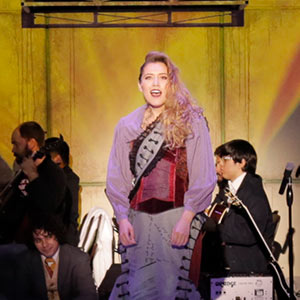Bent Review
— Fullerton College Hornet - Lisa Merchant and Vivianne Wightman - Friday, October 2nd, 1992
There was little difference in the eyes of the government in being gay or Jewish in Nazi-dominated Germany.
This is shown graphically in Martin Sherman's play "Bent," directed by Gary Krinke, now showing in the Bronwyn Dodson Theatre through October 3, with additional performances on December 1 and 4.
Max, the main character, and his lover Rudy are openly gay men in Berlin during the 30s. After Max had a love affair with a soldier (Wolfgang) both he and Rudy were captured by SS police.
Interned in the concentration camp, Max is forced to choose between wearing the yellow Star of David, representing Jews, or a pink triangle, representing homosexuality.
Like the Jews, gays were singled out and persecuted.
The audience may be uncomfortable with the sexual interactions of the characters, but even more upsetting is the reality that gays like Jews were killed for merely being themselves.
Even though the subject matter was difficult for the actors to project, they did it with believablilty and emotion.
Actor Pete Shilaimon (Max) made the struggles of being a homosexual in fascist Europe seem realistic with his strong performance.
Playing along side Shilaimon, actor Mark Fleshner (Rudy) carried the role of Max's jealous lover with sensitivity, while sometimes over-emphasizing gay characteristics.
Actor Matthew Johnson (Horst) a homosexual in the concentration camp, convincingly portrayed the more openly emotional and sensitive inmate opposite the stronger character Max.
Capturing the atmosphere of prewar Germany, set designer Robert Jensen used barbed-wire fencing, dim lighting, and a black background to portray the solemn mood of a Nazi concentration camp.
Adding to the authenticity of the set were the costumes-from striped prison uniforms labeled with yellow stars and pink triangles to the drab German military uniforms.
To break the spirit of the prisoners, guards gave them the repetitive task of carrying rocks from rock pile to rock pile year after year, until it finally drove them to insanity or death.
"Bent" held the audiences attention with its thought-provoking story line, and its grasp of the grim reality of life for gays in Nazi Germany.








